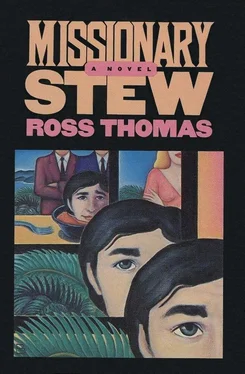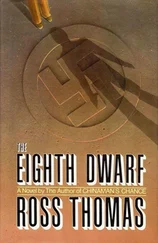Ross Thomas - Missionary Stew
Здесь есть возможность читать онлайн «Ross Thomas - Missionary Stew» весь текст электронной книги совершенно бесплатно (целиком полную версию без сокращений). В некоторых случаях можно слушать аудио, скачать через торрент в формате fb2 и присутствует краткое содержание. Город: New York, Год выпуска: 1983, ISBN: 1983, Издательство: Simon & Schuster, Жанр: Политический детектив, на английском языке. Описание произведения, (предисловие) а так же отзывы посетителей доступны на портале библиотеки ЛибКат.
- Название:Missionary Stew
- Автор:
- Издательство:Simon & Schuster
- Жанр:
- Год:1983
- Город:New York
- ISBN:978-0-671-49363-9
- Рейтинг книги:3 / 5. Голосов: 1
-
Избранное:Добавить в избранное
- Отзывы:
-
Ваша оценка:
- 60
- 1
- 2
- 3
- 4
- 5
Missionary Stew: краткое содержание, описание и аннотация
Предлагаем к чтению аннотацию, описание, краткое содержание или предисловие (зависит от того, что написал сам автор книги «Missionary Stew»). Если вы не нашли необходимую информацию о книге — напишите в комментариях, мы постараемся отыскать её.
Missionary Stew — читать онлайн бесплатно полную книгу (весь текст) целиком
Ниже представлен текст книги, разбитый по страницам. Система сохранения места последней прочитанной страницы, позволяет с удобством читать онлайн бесплатно книгу «Missionary Stew», без необходимости каждый раз заново искать на чём Вы остановились. Поставьте закладку, и сможете в любой момент перейти на страницу, на которой закончили чтение.
Интервал:
Закладка:
“Blaine,” Citron said. “James G. Blaine.”
“His real name was Livingstone Creek, although everyone always called him either Stony or the Hallmark.” Tighe paused. “He was pretty good.”
“That still doesn’t tell me who he was.”
“Well,” Yarn said, “the Hallmark here was the one they always sent when they wanted to send their very best.”
They walked Citron away from his Fiesta and down the rutted trail and around a curve to where a green BMW 320i was parked. They went past the BMW and the only comment they gave it was when Tighe said, “The Hallmark always did like a nice machine.”
Around another curve in the trail was parked a dusty four-door white Volkswagen. Tighe opened the rear door and indicated that Citron should get in. “Ours,” he said. “He followed you and we followed him.”
“I thought he was supposed to be the best,” Citron said as he got into the rear seat.
“We’re the best,” Tighe said, getting in beside him.
Yarn slipped in behind the wheel of the VW and backed it down the trail until he came to a spot where it was wide enough to make the turnaround. They drove in silence along the bumpy dirt road until Citron said, “You can drop me off at my hotel. The Inter-Continental.”
“Afraid not,” Tighe said.
“I thought you were supposed to be my baby-sitters.”
“Oh, we are, we are. But we don’t want to wind up doing life in Leavenworth — or Atlanta either, for that matter, and neither does Gladys.”
“Especially Gladys,” Yarn said.
“So what happens to me?”
“Well, we just might have to tuck you away for a while,” Tighe said.
“Where?”
“That’s what we’re gonna talk to the general about,” Tighe said. “They’ve got a pretty nice jail right here in the capital, and then there’s another one over on the east coast that’s not so nice. Sort of hot over there. On the east coast.”
“No jail,” Citron said.
“That’s right, I almost forgot,” Yarn said. “You just got out, didn’t you, about a year ago? In Africa.”
“Yes,” Citron said. “Africa.”
“Tell me something,” Tighe said. “Was that chief spear-chucker over there really a cannibal like they all claimed?”
“Yes.”
“No kidding? Well, I don’t know what kind of jail he ran, but I imagine it’s going to seem like the Ritz compared to the one over on the east coast here.”
“No jail,” Citron said.
“You hear that?” Tighe asked. “Morgan here doesn’t like the idea of spending two, three, maybe four years in some beaner jail.”
“Can’t say I blame him,” Yarn said.
“Of course,” Tighe continued, “you may not have to go. It all depends.”
“On what?”
“On how much you know.”
“I don’t know anything.”
Tighe sighed heavily. “Morgan, let me tell you something. For your own good. All Gladys said was that we’ve got to keep you alive. That’s all. I mean, Gladys is probably just one hell of a mother, but for some reason I don’t think she’s the type who’d spend the rest of her life in the slammer for her baby boy, although, like I said, she really must be some mom.”
“But it’s not up to us, you’ve got to understand,” Yarn said.
“Who’s it up to?”
“The general.”
“You see, Morgan,” Tighe said, “the general’s going to want to know what you know.”
“Very little,” Citron said. “Almost nothing.”
“Well, I believe you, and Yarn up there, he believes you, but the general, well, he’s going to want to take you down in the cellar and beat the shit out of you and stick hot wires up your dong just to make sure.”
“A very cautious guy, the general,” Yarn said.
“And mean. About the only thing meaner is a Cuban.”
“Or a Uruguayan. They’re pretty mean, too.”
“So what do you want?” Citron said.
“Tell us what you know,” Tighe said. “Tell us what you know, and what you think you know, and what you’ve guessed, and even what you think you’ve guessed. Then we’ll tell the general that all you’ve done is to make some pretty wild guesses and we don’t see any reason to keep you in the pokey for more than a month at the most, and no reason at all to take you down in the cellar and shove hot wires up your dong.”
“A month,” Citron said. “I’m not sure I can take a month.”
“What about the hot wires?”
“No, I couldn’t take that either.”
“Then let’s hear it,” Yarn said from the front seat. “Your version.” He pulled the car to a stop, turned off the engine, and twisted around in the seat.
Citron took a deep breath and let it out slowly. “You suckered them, didn’t you?” he said. “Langley, I mean.”
There was a long silence until Yarn said, “That’s right. We suckered them.”
Chapter 31
Draper Haere walked back to the Inter-Continental from the American embassy. It was a four-mile walk that led him past the Presidential Palace. He paused to examine the bullet holes in the wall where the President had been executed and wondered if the generals might someday commemorate the spot with a plaque.
Haere walked slowly, because it was hot and because the leisurely pace enabled him to gawk at whatever caught his interest: a three-hundred-year-old Spanish colonial house, a pair of eleven-year-old prostitutes, a forty-one-year-old Buick Roadmaster taxi, and a man in his late twenties who played the guitar while his five-year-old son sang a sad song about how desperately poor they were and held out an International Harvester cap into which no one but Haere dropped any money.
Across the square from the cathedral in a large crowded outdoor cafe, Haere found a vacant table and ordered a cup of coffee. He was halfway through the cup when a man sat down beside him. The man was young, somewhere around twenty-three or twenty-four, and wore a white short-sleeved shirt and dark pants. Haere thought he looked vaguely familiar.
“Naturally, you do not remember me,” the man said in English which had almost no accent.
“You look familiar.”
“Really? I’m surprised.”
“Why?”
“Busboys are rarely remembered.”
It came to Haere then. “At the hotel last night. You replaced the napkins that didn’t need replacing.”
The man smiled politely as though Haere had remarked upon the weather. “We are being watched. In a moment a taxi will arrive. I will get into it. You will remain here. They will follow me. Agreed?”
Haere nodded. “What’s the problem?”
“Please listen carefully,” the man said and looked up at the sky as if to check on the chance of rain. “The man your Mr. Citron met with this morning has been murdered. Smile, please.”
Haere made himself smile. “And Citron?”
The man smiled back. “He was taken to the Presidential Palace by two North Americans. In their early thirties. They shot and killed the man who murdered our leader. Please laugh a little.”
Haere chuckled and nodded.
“Very good,” the busboy said. “The man who killed our leader arrived with you on the flight yesterday.”
“He called himself Dr. Blaine.”
“We have reason to believe he was a hired killer, one without politics, who was sent to kill both you and Mr. Citron. Another small laugh, if you can.”
Haere chuckled appreciatively. “The two North Americans who took Citron to the Presidential Palace?” he asked, still chuckling.
The busboy grinned broadly and wagged his head. “One had blue eyes, one had brown. That’s all I know.” He looked at his watch. “Please remain here until I’ve gone.”
Haere tried, but failed, to keep smiling as the busboy rose with a grin and made his way through the tables to the sidewalk. A taxi pulled up. Haere noted that it was the same 1941 Buick Roadmaster he had seen earlier. The busboy reached for the rear door handle. He had his hand on it when two men in open-necked shirts, sport coats, and blue jeans moved up to him from behind and jammed short-barreled revolvers into his back. The busboy tried to wrench the Buick’s door open, but the old taxi was already pulling away when the two men with the revolvers began firing.
Читать дальшеИнтервал:
Закладка:
Похожие книги на «Missionary Stew»
Представляем Вашему вниманию похожие книги на «Missionary Stew» списком для выбора. Мы отобрали схожую по названию и смыслу литературу в надежде предоставить читателям больше вариантов отыскать новые, интересные, ещё непрочитанные произведения.
Обсуждение, отзывы о книге «Missionary Stew» и просто собственные мнения читателей. Оставьте ваши комментарии, напишите, что Вы думаете о произведении, его смысле или главных героях. Укажите что конкретно понравилось, а что нет, и почему Вы так считаете.












